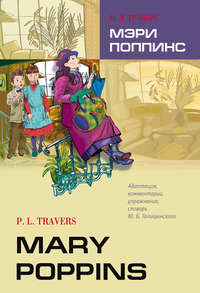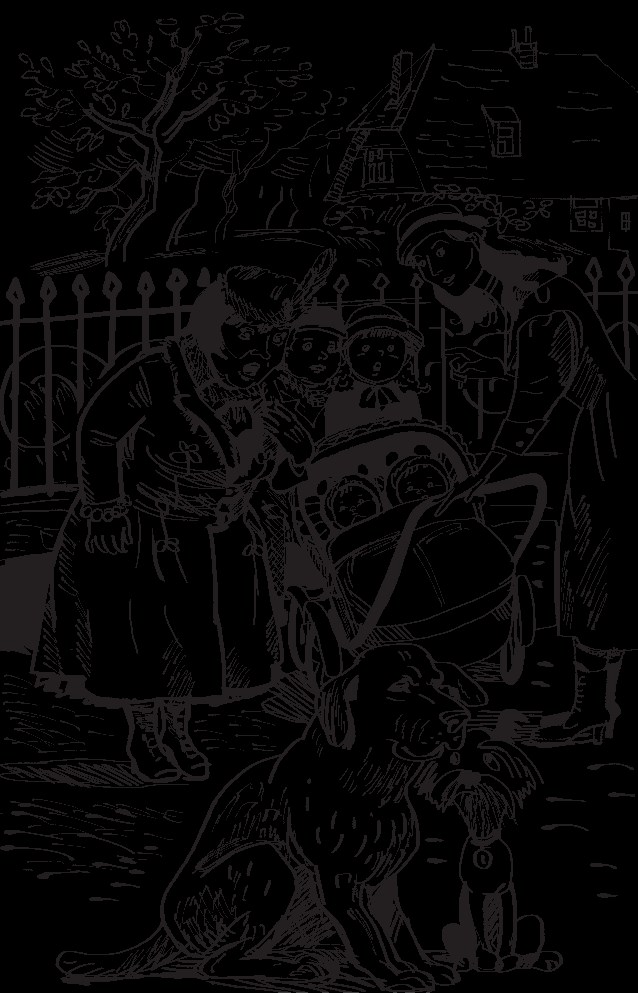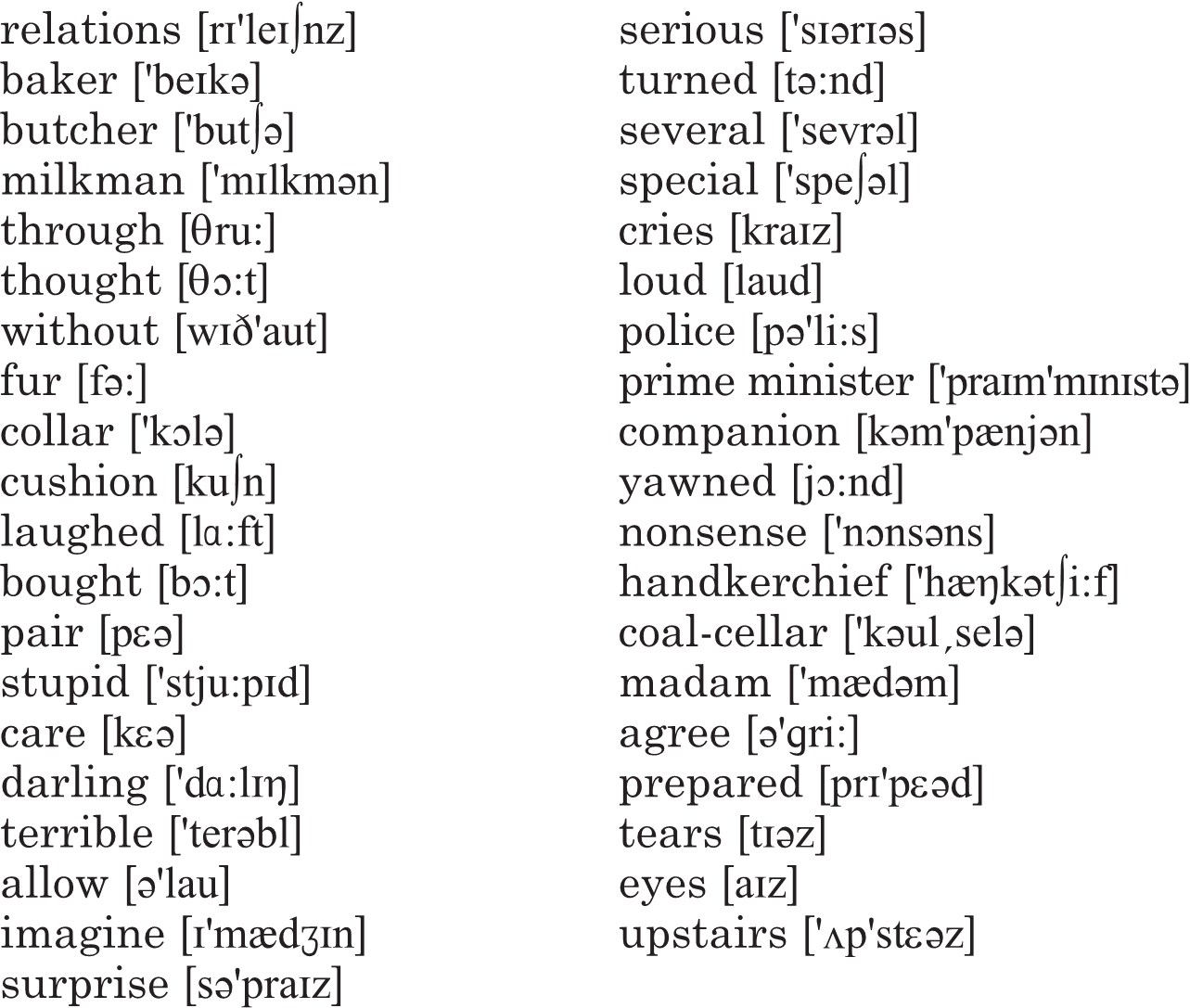
Mary Poppins / Мэри Поппинс. Книга для чтения на английском языке
14. Usually people begin ___ bread and butter.
15. And he cut a large piece ___ cake ___ everybody.
6. Find in the text the sentences in which the following word-combinations are used. Use them in sentences of your own.
As soon as; began to shake with laughter; come along; turned the corner; it’s very nice of you; don’t make me laugh; to their surprise; stopped laughing.
7. Find in the text the English equivalents of the following words, word-combinations and sentences. Use them in sentences of your own.
Сошли с автобуса; вы уверены? привести вас к чаю; его зовут мистер Уигг; они повернули за угол; Мэри Поппинс позвонила в дверной звонок; вежливый; даже; я горжусь этим; в этот день; конечно; приятно; странно; поведение; я очень сожалею; пора идти домой.
8. Who said the following words? Under what circumstances?
1. Are you sure your Uncle is at home?
2. How can you call me Mrs. Wigg?
3. How do you do, Mrs. Wigg.
4. I have never seen such a sight.
5. We must think of something serious.
6. It was a very pleasant afternoon, wasn’t it?
7. I see you don’t like it. I am very sorry. But you see that I can’t help it.
8. Think of something funny and come up here.
9. Is it because he has a wig on his head?
10. It is time to go home.
9. Act out the following conversations.
1. Michael, Jane, Mary Poppins, Miss Persimmon, from the beginning of the episode up to “… Go upstairs and to the first door on the landing.”
2. Mr. Wigg and Mary Poppins, from the moment they entered the room, up to “… I won’t laugh – if I can.”
3. Mr. Wigg, Jane, Michael, Mary Poppins, when they asked Mary Poppins to come up to them, from “I see you don’t like it, my dear…” up to “… But I see that you cannot come down.”
10. Answer the following questions.
1. Whom did Michael, Jane and Mary Poppins go to see one day?
2. What question did Michael ask Mary Poppins about her Uncle’s name? What did Mary Poppins answer?
3. What did Mary Poppins use for a mirror to put her hat straight? What did she like to do when she was walking along the street?
4. What was Mary Poppins wearing that day? How did she think she looked?
5. Who opened the door when they rang the bell? How did Miss Persimmon look? What kind of voice did she have? Why was she angry? How did she show that she was angry?
6. What did the children see in Mr. Wigg’s room when they entered?
7. Was Mr. Wigg in the room when the children and Mary Poppins entered? Why couldn’t the children see him?
8. How did Mr. Wigg look?
9. Mr. Wigg was a merry man, wasn’t he? What did he like to do? What could he laugh at?
10. What always happened to Mr. Wigg if his birthday came on Friday and he laughed on that day?
11. What happened to Mr. Wigg one day when he was at the circus on his birthday?
12. Why did Jane and Michael begin laughing?
13. What strange thing happened to Michael and Jane when they were laughing and could not stop?
14. Did Mr. Wigg like it when the children flew up to the ceiling? What did he say to them?
15. What did Michael and Jane ask Mary Poppins to do?
Did she fly up to them?
16. What did Mary Poppins do with the table?
17. Did they enjoy their tea? What was the first sad thought of the afternoon? Why did they all come down on the floor?
3. MISS LARK’S ANDREW
Miss Lark lived in the next house.
The house was very big and beautiful, and in the garden Miss Lark had two gates. One gate was for her friends and relations. And the other gate was for the Baker, the Butcher and the Milkman.
One day the Baker made a mistake and came through the gate which was for Miss Lark’s friends and relations. And Miss Lark was very angry.
All day long Jane and Michael could hear Miss Lark’s voice. Her voice was very loud. And the children always heard:
“Andrew, where are you?” or
“Andrew, you mustn’t go out without your overcoat!” or
“Andrew, come to Mother!”
And if you didn’t know, you could think that Andrew was a little boy. And Jane thought that Miss Lark thought that Andrew was a little boy. But Andrew wasn’t a little boy. He was a dog – a little dog which looked like a fur collar33.
Andrew lived like a king. He slept on a silk cushion in Miss Lark’s room; he ate cream every day; he had four overcoats in different colours. Every day he had things which people usually have only on birthdays. And when Andrew himself had a birthday, he had a big cake.
People did not like Andrew and laughed at him. And when Miss Lark bought him two pairs of small boots, people came to their gates to look at him and laugh.
“He is stupid,” said Michael one day when the children were looking at Andrew through the fence between their garden and Miss Lark’s garden.
“How do you know?” asked Jane.
“I know because Daddy called him stupid this morning,” said Michael.
“He is not stupid,” said Mary Poppins.
And Mary Poppins was right. Andrew wasn’t stupid, and you will very soon see it.
You must not think that he did not love Miss Lark. He loved her, because she was always very kind to him and took good care of him. But he did not like his life. He did not want to wear overcoats and boots. He wanted to be a common dog34. And he always chose common dogs for his friends35. And so he often sat at the gate of the garden and looked out into the street. And when he saw a common dog, he always liked to talk to him.
Miss Lark did not like it. And when she saw that Andrew was sitting at the gate and talking to a common dog, she called:
“Andrew, Andrew, come home, my darling! Don’t talk to these terrible street dogs!”
And Miss Lark never allowed Andrew to go out of the garden into the street. You could see him in the street or in the park only with Miss Lark.
Imagine, then, the surprise of Jane and Michael, when they saw Andrew one day in the park without Miss Lark. He was running very quickly and looked very serious.
“Hi, Andrew! Where is your overcoat?” cried Michael.
Andrew stopped and looked at the children. Then he turned to Mary Poppins and barked.
“Yap-yap!” said Andrew several times very quickly.
“Let me see36,” said Mary Poppins. “I think it’s the first turning on your right37 and the second house on the left.”
“Yap-yap,” said Andrew several times very quickly again.
“No – not a garden. Only a back yard,” said Mary Poppins. “The gate is usually open.”
Andrew barked again.
“I don’t know,” said Mary Poppins. “But I think so. He usually goes home at tea-time.”
Andrew barked again and ran away.
Jane’s and Michael’s eyes were round with surprise.
“What did he say?” they asked together.
“Nothing special,’’ said Mary Poppins.
“No,” said Michael. “I think he asked you where somebody lived.”
“Well, if you know, why do you ask me,” said Mary Poppins and sniffed.
“Oh, Michael,” said Jane. “She will never tell us if you talk like that. Mary Poppins, please, tell us what Andrew was saying to you. Please!”
“Ask him. He knows – Mr. Know-All!” said Mary Poppins and sniffed again.
“Oh no, I don’t know, Mary Poppins,” said Michael. “Please tell us.”
“It is half-past three. Tea-time,” said Mary Poppins. And they turned and went home.
When they were near their house, they suddenly heard loud cries coming from Miss Lark’s house38. They looked and saw that Miss Lark was running about in her garden and crying: “Andrew, Andrew! Where are you? Oh, he is lost39! I must send for the Police. I must see the Prime Minister! Andrew is lost! Dear me40, dear me!”
“Poor Miss Lark!” said Jane.
At that moment Michael looked down the street and – saw Andrew!
“Look, look, Miss Lark!” he cried. “There’s Andrew! Look, he is walking along the street!”
“Where? Where? Show me!” cried Miss Lark and ran up to the gate.
And indeed, she saw Andrew. He was walking slowly along the street. And near Andrew they saw a common dog. Andrew and the common dog were walking together.
“Oh, how glad I am,” said Miss Lark.
They were all standing and looking, and Andrew and the common dog were coming nearer and nearer the gate of Miss Lark’s garden.
“Oh, that terrible dog,” said Miss Lark, looking at Andrew’s companion. “Shoo! Shoo! Go home!” she cried to the common dog.
But the common dog came up to the gate and sat down on the ground. He scratched his right ear with his left leg41 and yawned.
“Go away! Go home! Shoo!” said Miss Lark again in an angry voice. “And you, Andrew, go home this minute! For shame!42 Went into the street alone, and without your overcoat! I am angry with you.”
Andrew barked, but did not move.
“Do you understand, Andrew?’’ said Miss Lark. “Go home at once!”
Andrew barked again.
“He says,” said Mary Poppins, “that he won’t go home.”
Miss Lark turned and looked at her in great surprise.
“How do you know what my dog says, may I ask,” she said. “Of course, he will go home.”
Andrew shook his head43 and barked.
“He won’t,” said Mary Poppins. “He will go home only if his friend goes, too.”
“Nonsense!” said Miss Lark. “This terrible dog will never go into my garden.”

Andrew barked two or three times.
“He says he is quite serious,” said Mary Poppins. “And he says that if you don’t allow his friend to go into your house and live with him, he will go away and live with his friend.”
“Oh, Andrew, you can’t – you can’t, really! After all that I have done for you!’’ Miss Lark was ready to cry.
Andrew barked and turned away. The other dog got up.
“Oh, he is really going away!” cried Miss Lark. “I see it!” She cried a little into her handkerchief, then she said:
“All right, Andrew. It will be as you say. This – this common dog can stay with us. But of course, he will sleep in the coal-cellar.”
Andrew barked again.
“He says, madam,” said Mary Poppins, “that he does not agree. His friend must have a silk cushion and sleep in you room, too. Or Andrew himself will sleep in the coal-cellar with his friend.”
“Andrew, how can you?” cried Miss Lark. “I shall never agree to it.”
Andrew got up and prepared to go.
“Oh, he is leaving me!” cried Miss Lark. “All right, Andrew, very well. It will be as you wish. Oh, what a terrible dog! Oh, how can you, Andrew? What is he saying now?” she asked Mary Poppins, because Andrew was barking again.
“He says that he will never wear overcoats or boots – that is his last word,” said Mary Poppins.
“All right. Let’s go,” said Miss Lark with tears in her eyes. And she and the dogs went into the house.
“So you see, he isn’t stupid at all44,” said Jane, when they were going upstairs to Tea.
“Yes,” said Michael, “that’s right. He isn’t stupid. But how did Mary Poppins know it? What do you think?”
“I don’t know,” said Jane. “And I think she will never, never tell us…”
EXERCISES1. Practice the pronunciation of the following words.

2. Agree or disagree.
1. The house was very big and beautiful, and in the garden Miss Lark had two gates.
2. Andrew was a little boy.
3. People did not like Andrew and laughed at him.
4. When Miss Lark bought him two pairs of small boots, people went and bought boots for their dogs, too.
Конец ознакомительного фрагмента.
Текст предоставлен ООО «ЛитРес».
Прочитайте эту книгу целиком, купив полную легальную версию на ЛитРес.
Безопасно оплатить книгу можно банковской картой Visa, MasterCard, Maestro, со счета мобильного телефона, с платежного терминала, в салоне МТС или Связной, через PayPal, WebMoney, Яндекс.Деньги, QIWI Кошелек, бонусными картами или другим удобным Вам способом.
1
Cherry-Tree Lane ['tʃerı tri: leın] – переулок Вишневых деревьев (Вишневый переулок)
2
Michael [maıkl] – Майкл
3
Barbara ['bɑ:brə] – Барбара
4
lays the table ['leız ðə'teıbl] – накрывает на стол
5
waved his hand ['weıvd hız'hænd] – помахал рукой
6
at once [ət'wʌns] – сейчас же
7
There he is! ['ðɛə hi:'ız] – Вон он!
8
She only sniffed. [snıft] – Она только пренебрежительно хмыкнула (потянула носом).
9
She slid up the banisters! ['bænıstəz] – Она проехала вверх по перилам!
10
Did the Wind blow you here? – Вас принес сюда ветер?
11
Why – Ой
12
round her waist [weıst] – вокруг талии
13
a small folding armchair ['fəuldıŋ'ɑ:mtʃɛə] – маленькое складно́е кресло
14
I’ll stay till the Wind changes ['tʃeındʒız] – Я поживу (у вас), пока не переменится ветер
15
turned off the light – выключила свет
16
he has a wig – у него парик
17
put her hat straight [streıt] – поправила шляпу
18
She liked to look at herself in shop windows – Она любила смотреться в витрины магазинов
19
Come along – Пошли
20
Persimmon [pə'sımən] – Персиммон
21
welcome ['welkəm] – добро пожаловать
22
to their surprise [sə'praız] – к своему удивлению
23
began to shake with laughter ['lɑ:ftə] – начал трястись от смеха
24
I become filled with Laughing Gas ['lɑ:fıŋ'ɡæs] – наполняюсь смешливым газом
25
when it fills me – когда он наполняет меня
26
As soon as – Как только
27
Does it ever happen to you? – С вами это когда-нибудь случается?
28
don’t make me laugh – не заставляйте меня смеяться
29
I can’t help it – Я ничего не могу поделать
30
I have never seen such a sight [saıt] – Я никогда не видела такого зрелища
31
at your age – в вашем возрасте
32
It was the first sad thought – Это была первая грустная мысль
33
looked like a fur collar – был похож на меховой воротник
34
a common dog – обыкновенная собака
35
And he always chose common dogs for his friends – И он всегда выбирал себе в друзья обыкновенных собак
36
Let me see – Дай-ка мне подумать
37
the first turning on your right – первый поворот направо
38
coming from Miss Lark’s house – доносящиеся от дома мисс Ларк
39
he is lost – он потерялся
40
dear me – Боже мой!
41
with his left leg – левой ногой
42
For shame! – Стыдись!
43
shook his head – покачал головой
44
at all – совсем
Вы ознакомились с фрагментом книги.
Для бесплатного чтения открыта только часть текста.
Приобретайте полный текст книги у нашего партнера:
Всего 10 форматов